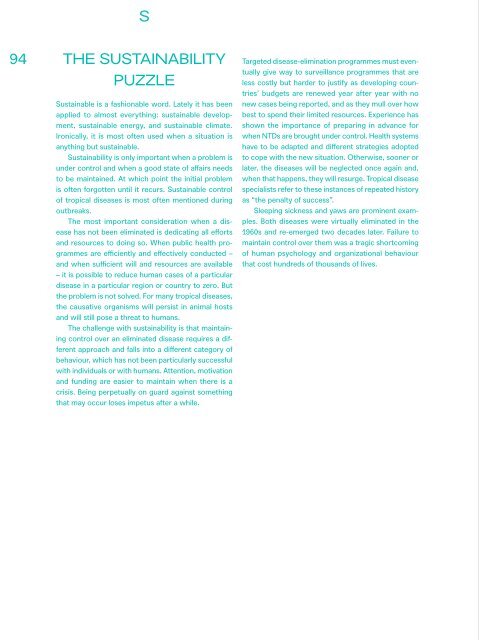You also want an ePaper? Increase the reach of your titles
YUMPU automatically turns print PDFs into web optimized ePapers that Google loves.
S<br />
94<br />
<strong>THE</strong> SUSTAINABILITY<br />
PUZZLE<br />
Sustainable is a fashionable word. Lately it has been<br />
applied to almost everything: sustainable development,<br />
sustainable energy, and sustainable climate.<br />
Ironically, it is most often used when a situation is<br />
anything but sustainable.<br />
Sustainability is only important when a problem is<br />
under control and when a good state of affairs needs<br />
to be maintained. At which point the initial problem<br />
is often forgotten until it recurs. Sustainable control<br />
of tropical diseases is most often mentioned during<br />
outbreaks.<br />
The most important consideration when a disease<br />
has not been eliminated is dedicating all efforts<br />
and resources to doing so. When public health programmes<br />
are efficiently and effectively conducted –<br />
and when sufficient will and resources are available<br />
– it is possible to reduce human cases of a particular<br />
disease in a particular region or country to zero. But<br />
the problem is not solved. For many tropical diseases,<br />
the causative organisms will persist in animal hosts<br />
and will still pose a threat to humans.<br />
The challenge with sustainability is that maintaining<br />
control over an eliminated disease requires a different<br />
approach and falls into a different category of<br />
behaviour, which has not been particularly successful<br />
with individuals or with humans. Attention, motivation<br />
and funding are easier to maintain when there is a<br />
crisis. Being perpetually on guard against something<br />
that may occur loses impetus after a while.<br />
Targeted disease-elimination programmes must eventually<br />
give way to surveillance programmes that are<br />
less costly but harder to justify as developing countries’<br />
budgets are renewed year after year with no<br />
new cases being reported, and as they mull over how<br />
best to spend their limited resources. Experience has<br />
shown the importance of preparing in advance for<br />
when NTDs are brought under control. Health systems<br />
have to be adapted and different strategies adopted<br />
to cope with the new situation. Otherwise, sooner or<br />
later, the diseases will be neglected once again and,<br />
when that happens, they will resurge. Tropical disease<br />
specialists refer to these instances of repeated history<br />
as “the penalty of success”.<br />
Sleeping sickness and yaws are prominent examples.<br />
Both diseases were virtually eliminated in the<br />
1960s and re-emerged two decades later. Failure to<br />
maintain control over them was a tragic shortcoming<br />
of human psychology and organizational behaviour<br />
that cost hundreds of thousands of lives.


